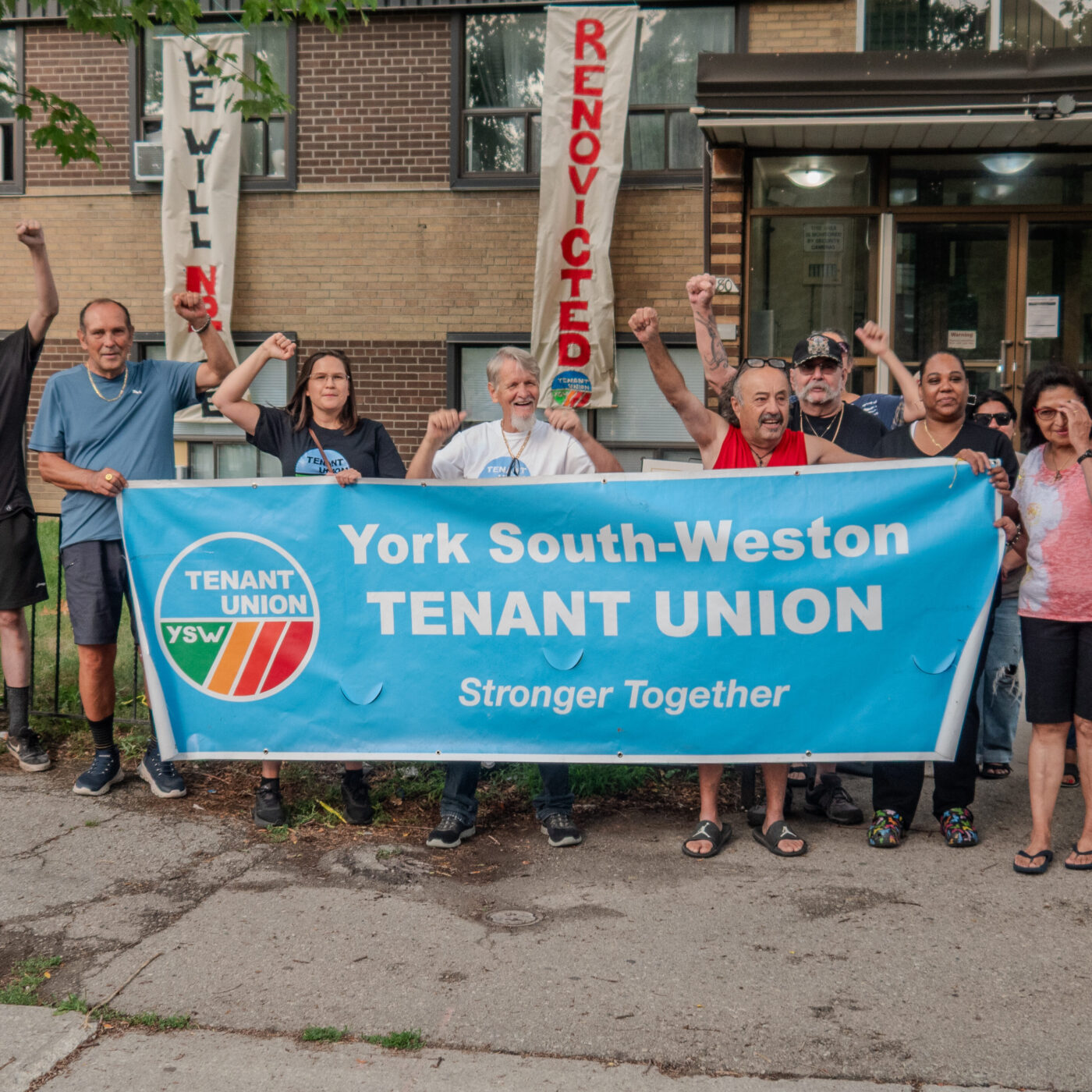THE GREEN LINE GUIDE TO...
2025 federal election
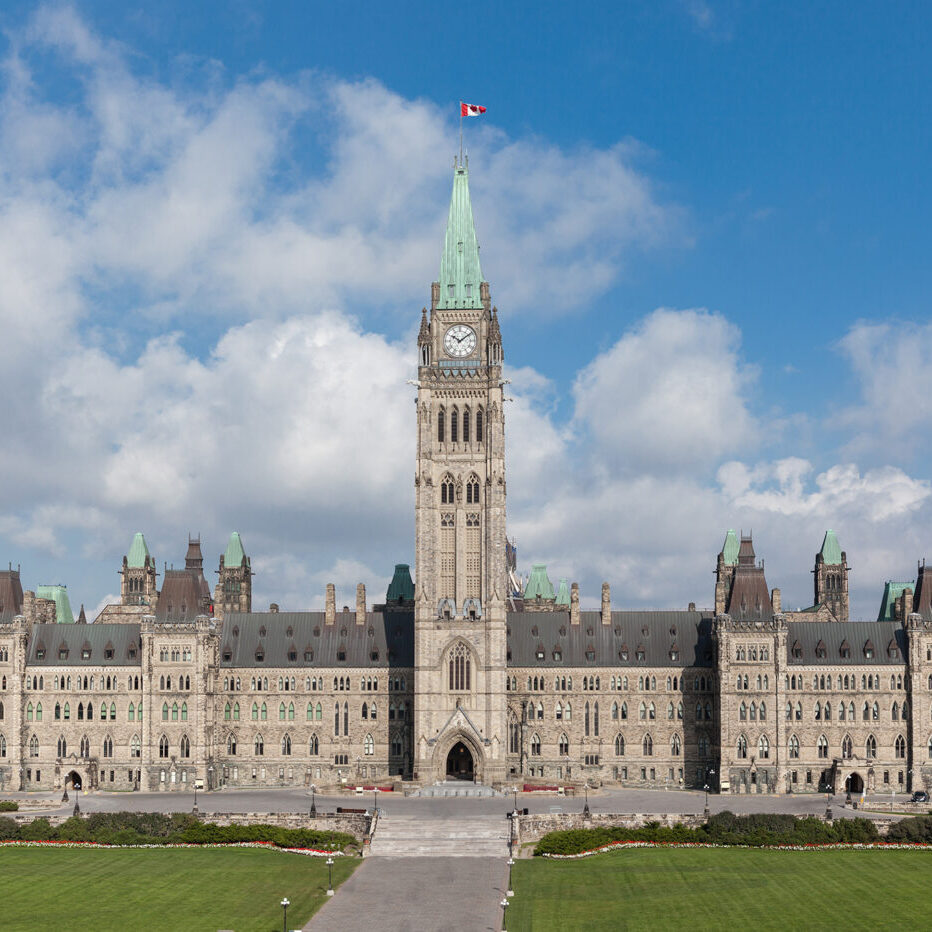

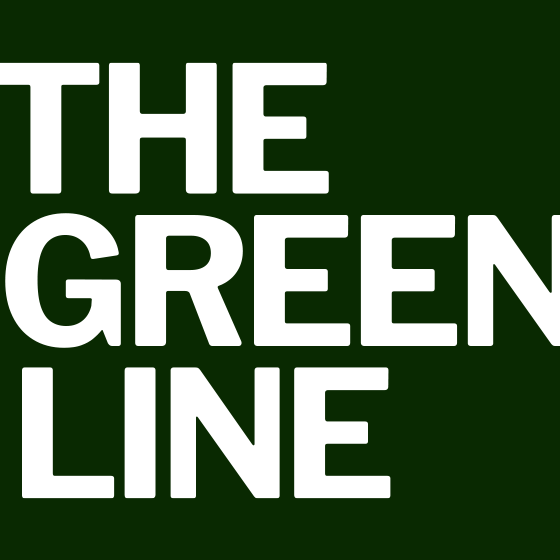
The Green Line
The Green Line is an award-winning, hyperlocal publication that delivers information you can actually use in your daily life.
April 7, 2025
Federal politics affect Torontonians every day.
From housing to food prices, many Canada-wide decisions play out in our daily lives. That's why, we want to help you be informed about the upcoming federal election.
We're heading to the polls on April 28. Are you ready to vote? Let us help you.
Step One: register to vote
Registering to vote is to confirm, update or add your information.
You can check if you’re registered to vote on elections.ca. The process is easily accessible and doesn’t require a lot of time.
You can register at the polls. But keep in mind that if you update and/or confirm your information in advance, the voting process will be faster.
If you're registered at your current address, you'll receive your voter information card in the mail, which tells you when, where and how to vote.
Now if you think you’re already registered, but you've moved since September 2021, it’s possible that your voter information card will go to your old address. You need to update your information to make sure that you receive the card in time, at the right address.
If nothing has changed for you, it's still a good idea to confirm your information and be on the safe side, but ultimately, it's personal preference.
After registering to vote, you have a few options.
- You can vote on election day by bringing your voter information card and ID at your assigned voting location.
- You can vote on a participating campus from April 13 to 16.
- You can vote in advance polling stations between April 18 to 21.
- You can vote early at any Elections Canada office near you by April 22 at 6 p.m.
- You can also apply to vote by mail. The deadline to do so is April 22.
Step two: Research political parties
How to choose who to vote for? Well, that's up to you.
To help you make an informed decision, we collected information on where the Liberal, Conservative, New Democratic and Green parties of Canada stand when it comes to The Green Line's five pillars of livability: housing, jobs, food, commuting and health.
Usually, you’d go to the election platforms for policy promises by each party. By the time of publication, not all parties had released election platforms. So, we dug online and reached out to the four represented national parties to put together the bullet points you see in these guides. The Liberal and Conservative parties did not respond to our requests for comment. The Green Party sent us their response by email for commuting and food. The New Democratic Party referred us to their press releases. This guide omits Bloc Québécois as they don’t run candidates in our province.
In most cases, we referred to policies posted on the parties’ websites. If we didn’t find the answers, we looked at their press releases, scrums, media comments and social media posts.
We also referred to party policy books when more up-to-date policy information wasn’t available. Party policy books are generally determined by party members voting on resolutions at party conventions. They may not reflect the positions of party leaders, especially in the case of a new leader being elected after a party’s most recent convention, such as in the case of Liberal Party leader Mark Carney.
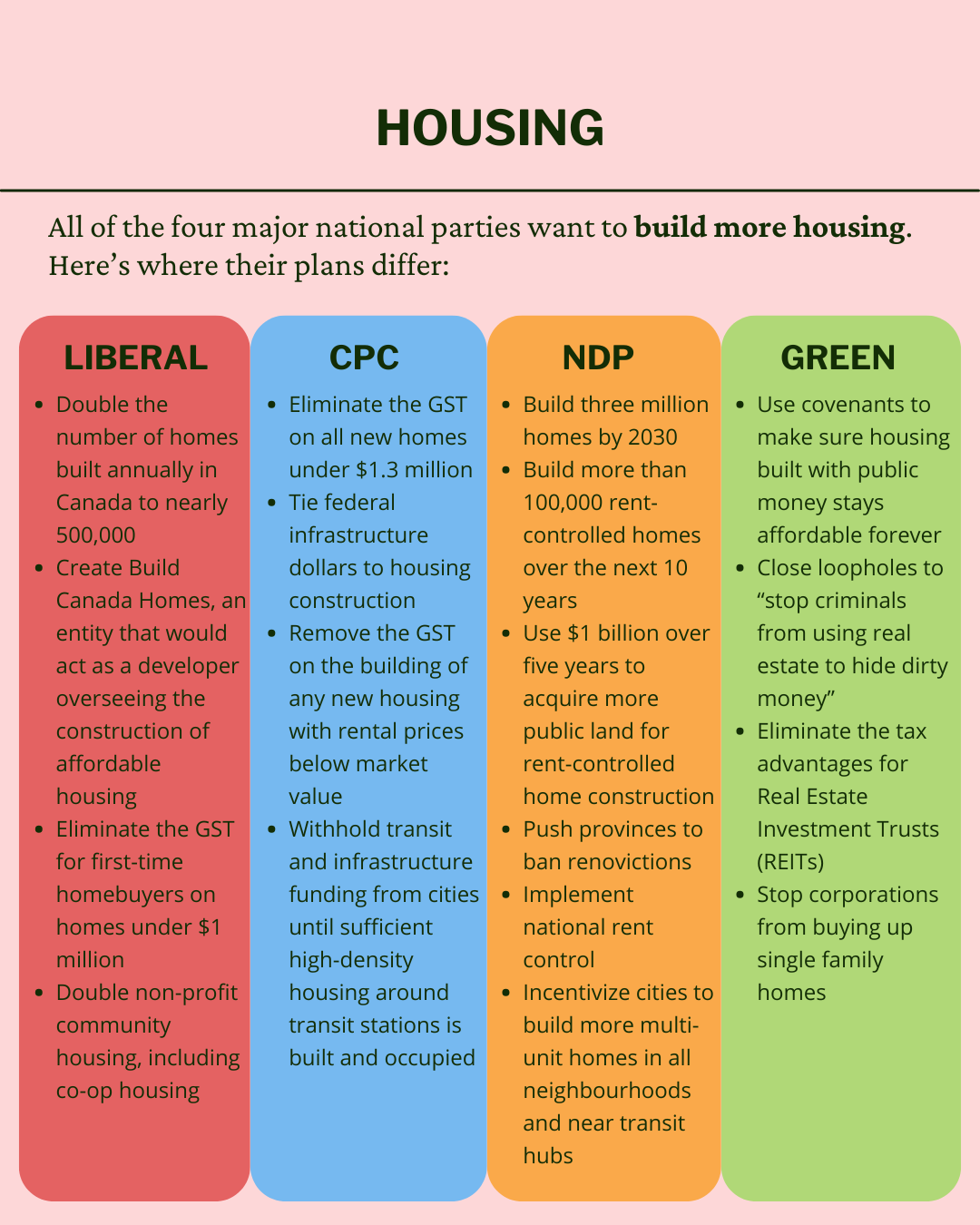
All four major national parties want to build more into housing.
Here are the Liberals' plans:
- Double the number of homes built annually in Canada to nearly 500,000
- Create Build Canada Homes, an entity that would act as a developer overseeing the construction of affordable housing
- Eliminate the GST for first-time homebuyers on homes under $1 million
- Expand access to funding and low-interest loans delivered by CMHC for small and non-profit builders
- Double non-profit community housing, including co-op housing
- Reduce fees, levies and taxes to drive down the cost of building, and accelerate permitting approvals
- Cut municipal development charges in half for multi-unit residential housing for a period of five years
Here are the CPC's plans:
- Eliminate the GST on all new homes under $1.3 million
- Tie federal infrastructure dollars to housing construction
- Remove the GST on the building of any new housing with rental prices below market value
- Withhold transit and infrastructure funding from cities until sufficient high-density housing around transit stations is built and occupied
- Sell 15 per cent of federally owned buildings so the land can be used to build affordable homes
Here are the NDP's plans:
- Build three million homes by 2030 through a permanent $16 billion national housing strategy
- Incentivize cities to build more multi-unit homes in all neighbourhoods and near transit hubs
- Implement national rent control to protect tenants
- Push provinces to ban renovictions
- Invest in the National Indigenous Housing Collaborative Inc.
- Build more than 100,000 rent-controlled homes over the next 10 years
- Use $1 billion over five years to acquire more public land for rent-controlled home construction
- Require the CMHC to offer low-interest, public-backed mortgages
- Invest more money in the Rental Protection Fund, a federal program that supports community housing projects
- Ban corporate landlords from buying existing affordable rental properties
- Ban foreign buyers from purchasing homes in Canada
Here are the Greens' plans:
- Use covenants to make sure housing built with public money stays affordable forever
- Close loopholes to “stop criminals from using real estate to hide dirty money”
- Eliminate the tax advantages for Real Estate Investment Trusts (REITs)
- Stop corporations from buying up single family homes
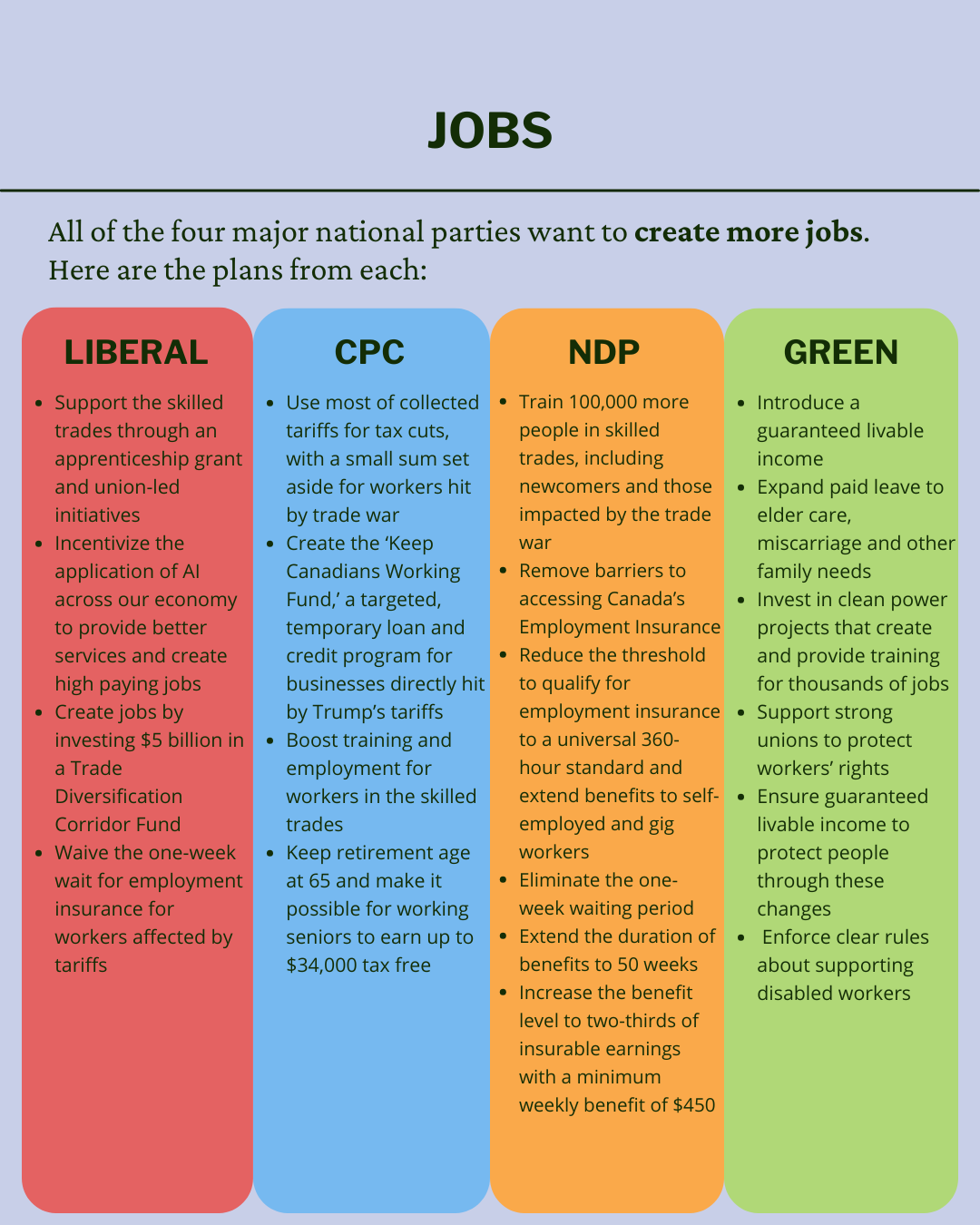
The four major national parties want to create jobs for Canadians and provide protections and benefits to workers, each in different ways.
Here are the Liberals' plans:
- Support the skilled trades through an apprenticeship grant, increased access to union-led training initiatives and a new $20 million capital funding stream for colleges to support new training spaces for apprenticeships
- Incentivize the application of AI across our economy to provide better services and create high-paying jobs for Canadians
- Create jobs by investing $5 billion in a Trade Diversification Corridor Fund to build infrastructure
- Waive the one-week wait for employment insurance for workers who lose their jobs to U.S. tariffs
- Suspend rules that prevent people from collecting employment insurance for six months if they have a severance package
Here are the CPC's plans:
- Create the ‘Keep Canadians Working Fund,’ a targeted, temporary loan and credit program for businesses directly hit by Trump’s tariffs
- Use most of collected tariffs for tax cuts, with a small sum set aside for workers hit by trade war
- Boost training and employment for workers in the skilled trades
- Keep the retirement age at 65, while also making it possible for working seniors to earn up to $34,000 tax free
- Knock down interprovincial barriers to help replace lost north-south trade with east-west trade and to make Canada self-reliant
- Bring home Canadian jobs by matching American tariffs on Chinese-produced electric vehicles (EVs) and EV components
Here are the NDP's plans:
- Train 100,000 more people in skilled trades, including newcomers and those impacted by the trade war
- Give money collected from counter-tariffs to workers and communities hit the hardest by the trade war
- Undertake a large public infrastructure-building program, creating jobs for Canadian construction and trades workers
- Raise the cap on the Wage Earner Protection Program to cover wages
- Expand the Companies’ Creditors Arrangement Act’s “super-priority” protections for workers to include post-employment benefits
- Reduce the threshold to qualify for employment insurance to a universal 360-hour standard and extend benefits to self-employed and gig workers.
Eliminate the one-week waiting period - Eliminate the one-week waiting period
- Increase the benefit level to two-thirds of insurable earnings with a minimum weekly benefit of $450
Here are the Greens' plans:
- Introduce a guaranteed livable income
- Expand paid leave to elder care, miscarriage and other family needs
- Invest in clean power projects that create and provide training for thousands of jobs
- Support strong unions to protect workers’ rights
- Ensure guaranteed livable income to protect people through these changes
- Enforce clear rules about supporting disabled workers
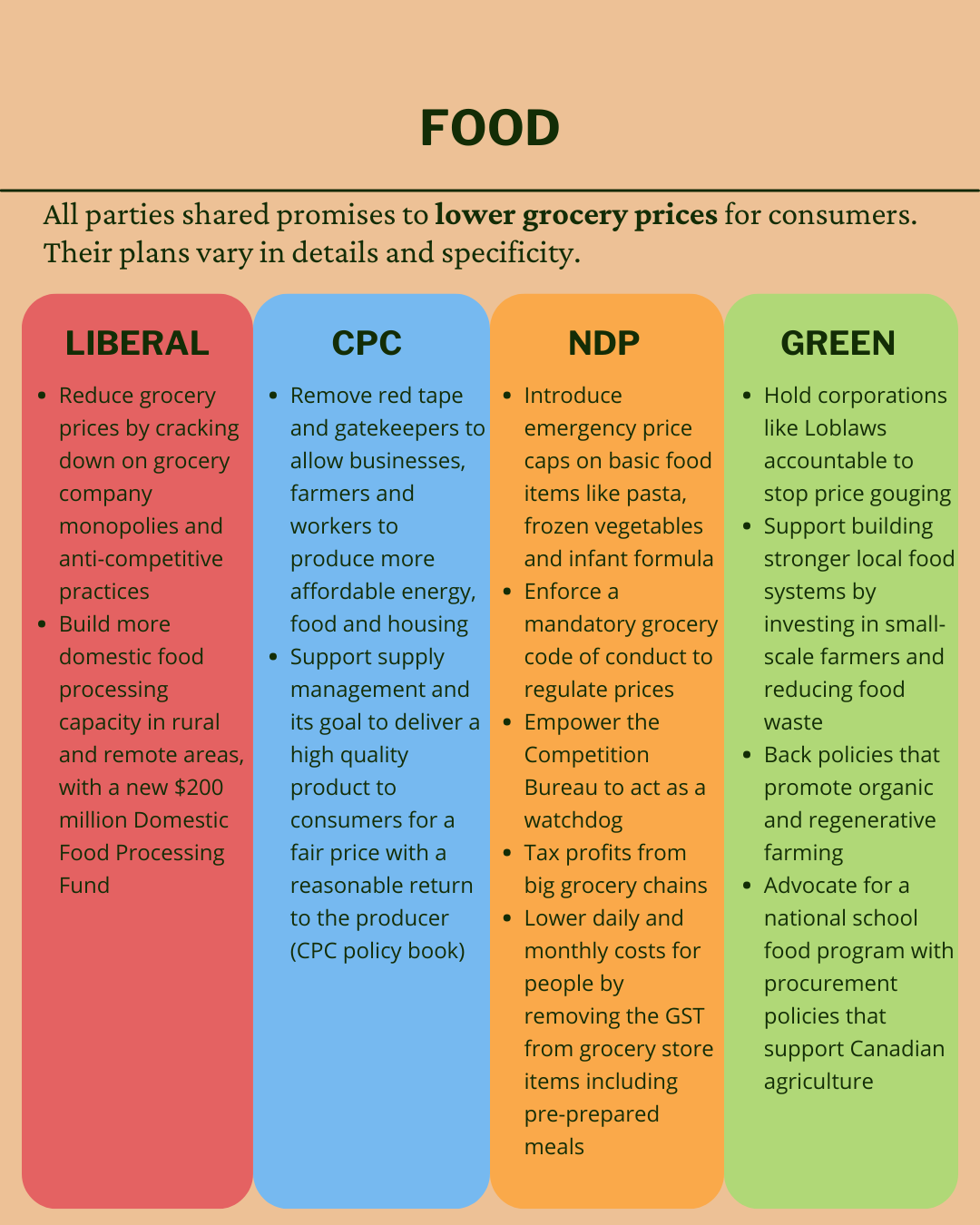
All four major national parties want to lower grocery prices for consumers.
Here are the Liberals' plans:
- Reduce grocery prices by cracking down on grocery company monopolies and anti-competitive practices
- Build more domestic food processing capacity in rural and remote areas, with a new $200 million Domestic Food Processing Fund
- Increase support for farmers, ranchers and producers to access new markets for their food products with an additional $30 million in the AgriMarketing Program
Here are the CPC's plans:
- Remove red tape and gatekeepers to allow businesses, farmers and workers to produce more affordable energy, food and housing
- Ensure accurate labelling of ingredients and countries of origin (CPC policy book)
- Ensure more rigorous safety testing of imported food products (CPC policy book)
- Support self-sufficiency in national food production, including increased diversification in the types of foods and agricultural products produced (CPC policy book)
- Support supply management and its goal to deliver a high quality product to consumers for a fair price with a reasonable return to the producer (CPC policy book)
Here are the NDP's plans:
- Lower daily and monthly costs for people by removing the GST from grocery store items including pre-prepared meals
- Introduce emergency price caps on basic food items like pasta, frozen vegetables and infant formula
- Enforce a mandatory grocery code of conduct to regulate prices
- Empower the Competition Bureau to act as a watchdog
- Tax profits from big grocery chains
Here are the Greens' plans:
- Hold corporations like Loblaws accountable to stop price-gouging in grocery stores
- Support building stronger local food systems by investing in small-scale farmers, reducing food waste and increasing food security
- Back policies that promote organic and regenerative farming
- Support tariffs on food imports from countries with weaker environmental and animal welfare protections
- Advocate for a national school food program with procurement policies that support Canadian agriculture
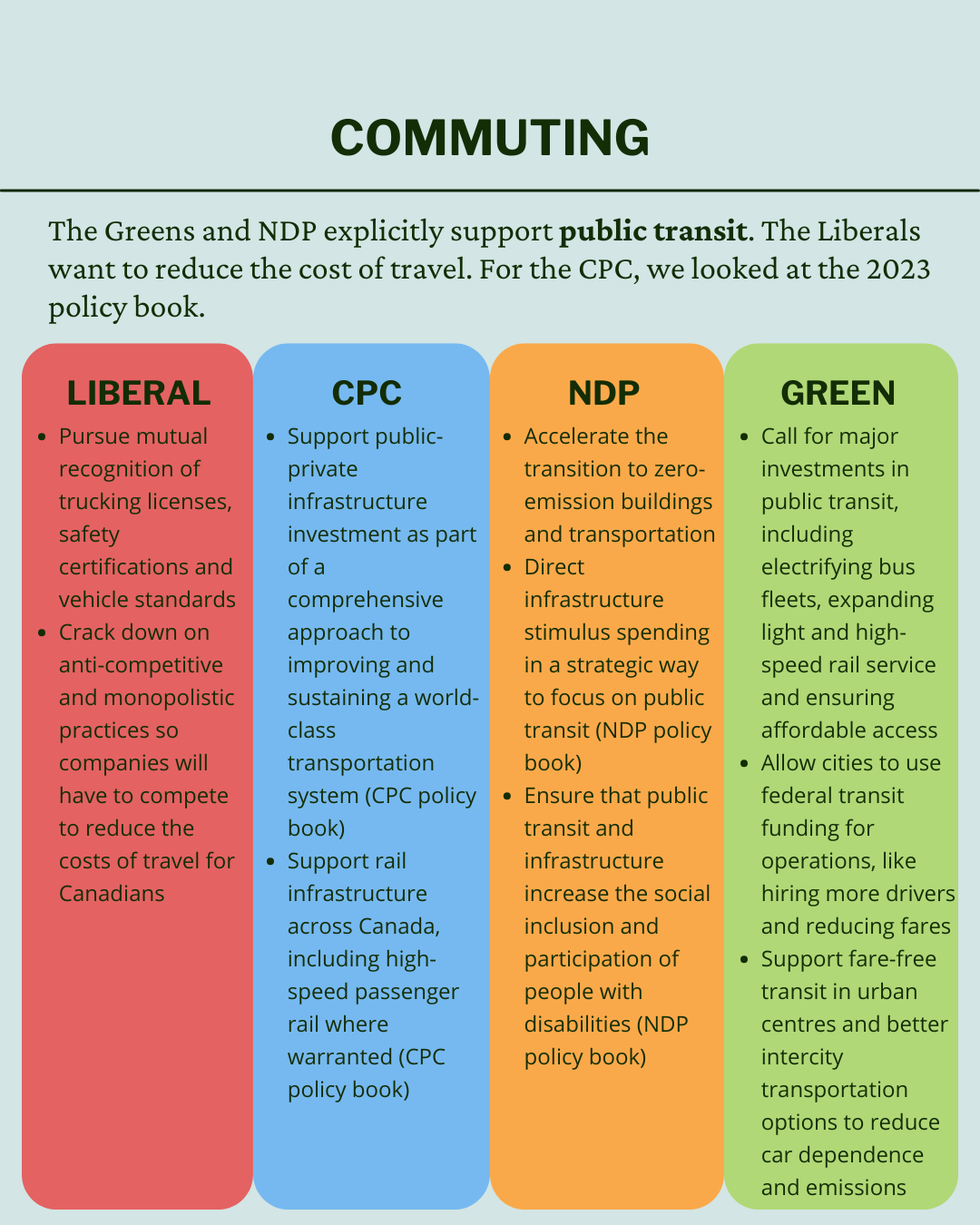
The Greens and NDP explicitly support public transit. The Liberals want to reduce the cost of travel. We didn't find recent promises from the CPC for commuting issues, so we looked at the most recent policy book from 2023.
Here are the Liberals' plans:
- Pursue mutual recognition of trucking licenses, safety certifications and vehicle standards
- Crack down on anti-competitive and monopolistic practices so companies will have to compete to reduce the costs of travel for Canadians
- Begin the processes required for the planning and construction of a new, distinct electric high-speed rail line, starting with the Windsor to Quebec City corridor (LPC policy book)
- Develop an affordable, accessible, modern and practical rail system for public transportation (LPC policy book)
- Create a fund that will cover the costs to incentivize the closure of major commercial streets to car traffic and test the scalability of such projects across cities in Canada (LPC policy book)
Here are the CPC's plans, from the 2023 policy book:
- Promote a new framework for increased domestic and foreign airline competition in Canada
- Support public-private infrastructure investment as part of a comprehensive approach to improving and sustaining a world-class transportation system
- Support the reduction or elimination of federal government fees, levies, taxes and rents associated with Canada’s national transportation system
- Support rail infrastructure across Canada, including high-speed passenger rail where warranted
Here are the NDP's plans:
- Protect public services like transit from cuts and privatization
- Mandate that federal departments and agencies —including Canada Post and the RCMP — purchase Canadian-made vehicles
- Accelerate the transition to zero-emission buildings and transportation (NDP policy book)
- Direct infrastructure stimulus spending in a strategic way to focus on public transit (NDP policy book)
- Ensure that public transit and infrastructure increase the social inclusion and participation of people with disabilities (NDP policy book)
Here are the Greens' plans:
- Call for major investments in public transit, including electrifying bus fleets, expanding light and high-speed rail service and ensuring affordable access
- Allow cities to use federal transit funding for operations, such as hiring more drivers and reducing fares
- Support fare-free transit in urban centres and better intercity transportation options to reduce car dependence and emissions
- Promote active transportation by investing in cycling and walking infrastructure
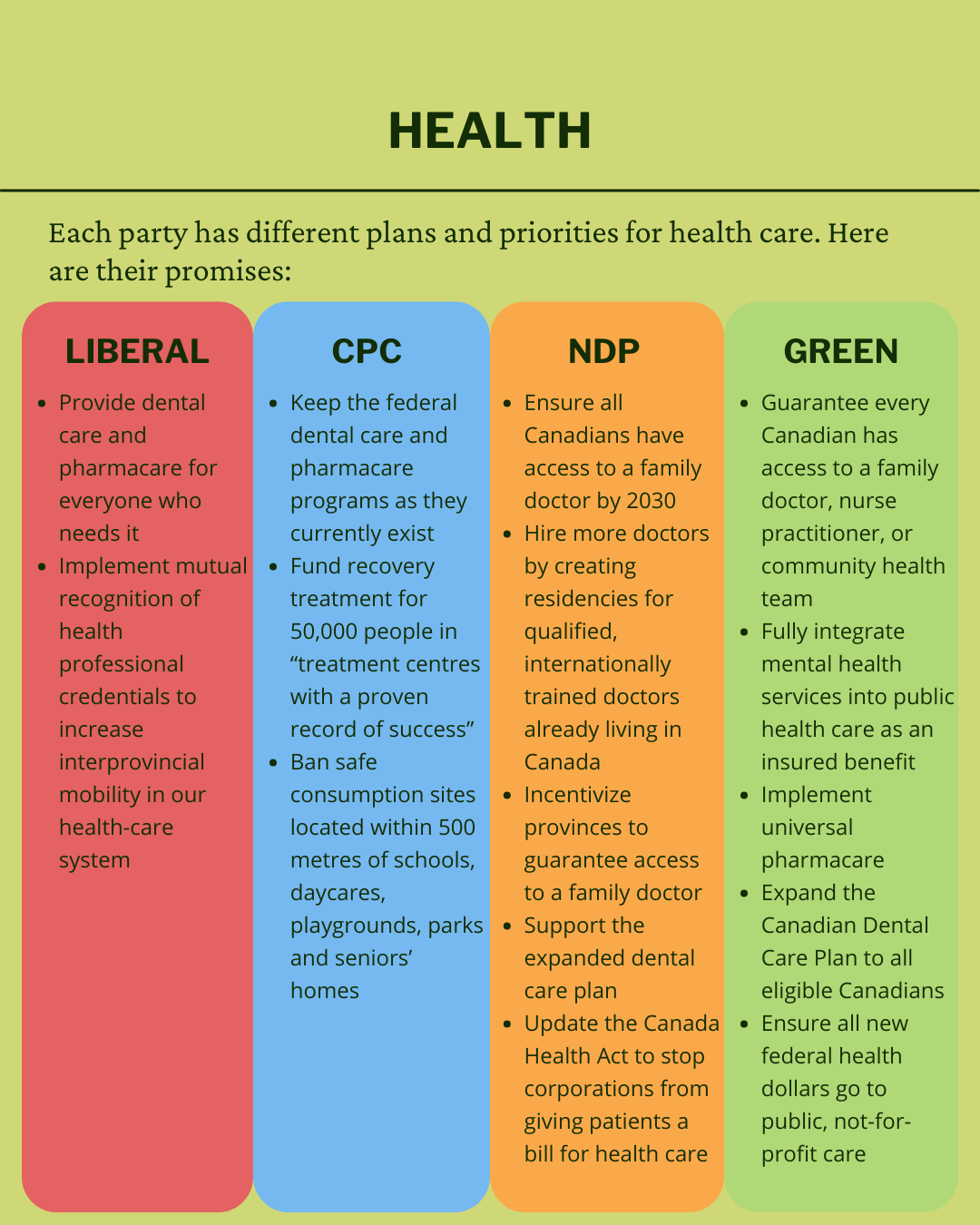
Each party has different plans and priorities for health care.
Here are the Liberals' plans:
- Provide dental care and pharmacare for everyone who needs it
- Implement mutual recognition of health professional credentials to increase interprovincial mobility in our health-care system
- Tie Canada Health Transfers to annual public reporting by provinces/territories on how their health-care dollars are spent (LPC policy book)
Here are the CPC's plans:
- Keep the federal dental care and pharmacare programs as they currently exist
- Fund recovery treatment for 50,000 people in “treatment centres with a proven record of success”
- Ban safe consumption sites located within 500 metres of schools, daycares, playgrounds, parks, and seniors’ homes
- Allow flexibility for the provinces and territories in the implementation of health services, including a balance of public and private delivery options (CPC policy book)
- Support doctors, nurses, and others in the option to refuse to participate in, or refer their patients for abortion, assisted suicide, or euthanasia (CPC policy book)
- Support domestic research, development and production of vaccines (CPC policy book)
- Affirm Canadians have the freedom and right to refuse vaccines for moral, religious, medical or other reasons (CPC policy book)
- Support the elimination of the GST on essential products for motherhood and the arrival of a newborn baby (CPC policy book)
Here are the NDP's plans:
- Ensure all Canadians have access to a family doctor by 2030
- Incentivize provinces to guarantee access to a family doctor through an additional one per cent in Canada Health Transfer funding
- Hire more doctors by creating residencies for qualified, internationally trained doctors already living in Canada
- Train and equip more doctors from northern and rural communities
- Support the expanded dental care plan
- Update the Canada Health Act to stop corporations from giving patients a bill for health care
- Give clear direction to the provinces, requiring them to cover more services, including health care by phone, laptop or in a clinic, and back it up by modernizing the Canada Health Act
- Ensure provinces bring in laws to go after the corporations who charge Canadians for the health care they need
- Establish a complete public pharmacare system within four years of being elected, starting with the expansion to 100 of the most prescribed medications, including pain medications and antibiotics
Here are the Greens' plans:
- Introduce a new Primary Care Health Act to guarantee every Canadian access to a family doctor, nurse practitioner, or community health team
- Fully integrate mental health services into public healthcare as an insured benefit
- Implement Universal Pharmacare to cover all prescription medication
- Expand the Canadian Dental Care Plan to all eligible Canadians
- Enforce and enhance the Canada Health Act to ensure all new federal health dollars go to public, not-for-profit care
- Invest in healthcare worker training and fair compensation, including streamlined credential recognition for internationally trained professionals
FREQUENTLY ASKED QUESTIONS
With elections coming up soon, we know a lot of you still have questions about registering, voting and finding out where parties stand. So, we'll try to answer the most common concerns.
We'll keep updating this section so if you have any more questions, make sure to message us on our socials or email us at hello@thegreenline.to.
Fact-Check Yourself
Sources and
further reading
Don't take our word for it —
check our sources for yourself.

